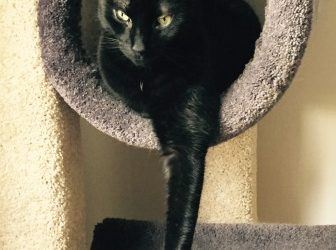When Barbara Czarzasty called me in August, 2004, her 13 year old Springer Spaniel named Patches had been suffering from laryngeal paralysis for four years.
One side of her vocal cords were paralyzed, causing shortness of breath accompanied by a loud, rasping sound.
Other than this, Patches was a healthy dog. Despite her age, she was active and bright-eyed, full of love and play.
Patches had some difficulty breathing nearly all the time, but her symptoms were much worse in hot, humid weather. When she was feeling relatively good on a summer day, she would ask to go sit in the pool to cool off.
When she felt bad, Barbara and her husband, Kevin, kept Patches indoors in the air conditioning. Even inside, she would struggle to breathe.
In hot, humid weather, each breath was hard work. The sparkle would disappear from Patches’ eyes, and she would even mess herself. Steroid injections would help for awhile.
Barbara and Kevin didn’t want Patches to suffer and were thinking about euthanizing her soon. Barbara was very torn when she called me.
Kevin and I have a very hard decision to make. Patches is my best friend and she’s been through a lot of good times and bad with us. The last thing I want to do is have her suffer because I can’t let go, but I’m not sure she’s ready to go.
Patches breathing was so loud I could hear her over the phone as Barbara and I talked. After Barbara gave me the medical history, I asked Patches if she was ready to leave.
Barbara told me,
[Nedda] spoke with Patches and me for quite awhile. As the conversation progressed, I noticed Patches’ breathing was becoming less and less labored and she was starting to relax.
Patches wasn’t ready to give up her life. She loved her family, who are involved in both breeding and rescuing Springer Spaniels, and she wanted to continue contributing to all family activities. Patches wanted to be with those she loved so much. She wasn’t interested in discussing euthanasia.
The weather report for the coming weekend was more heat and humidity, which Barbara feared would be too much for Patches. I suggested that we try one healing session immediately and wait until the following Monday for Barbara give me an update.
My healing guides were indicating that the energy around Patches’ vocal chords was very congested and that the etheric template (the blueprint for the body’s physical design) had been damaged.
The healing was done from a distance. During the session, the guides cleansed and repaired not only the etheric template, but Patches’ Throat Chakra. They also worked on the nerves that connect to the larynx. Then we balanced and filled up her whole body with multi-dimensional pranic energies, Spiritual Light, and Love Without Conditions.
After the healing, Barbara wrote,
I can honestly say that this was the first time in months Patches was able to sleep through the night peacefully. The next morning, she was able to go downstairs on her own, where she picked up her favorite toy to take outside with her to do her business. That horrible raspy sound was gone and the sparkle was back in her eyes.
I spoke with Barbara again after the heat and humidity of the weekend had passed over our location. Her report was very good, but the guides wanted one follow-up session to eliminate any residual energy that might need to be removed.
The body releases in layers, and they wanted to be sure that everything that needed to go would be gone.
Barbara reported:
It’s been over 2 weeks since our first conversation with Nedda, and Patches is doing great! She is back to her normal self and enjoying life without having to struggle to breathe. She’s even realized she can counter surf again to find some tasty snacks. Thank you for sharing your gift of communication and healing with us.
As with any healing, it is up to the individual body what it will do with the energy. Success is never guaranteed.
Still, it is always wonderful to hear when an animal recovers from a long-term chronic problem.
* * * * Some additional information about Laryngeal Paralysis in dogs. * * * *
According to EmbracePetInsurance.com,
Laryngeal paralysis can occur because of trauma or damage to the throat, age-related nerve disease (known as geriatric onset laryngeal paralysis and polyneuropathy), or it may be present at birth (known as a congenital condition). Laryngeal paralysis in dogs is very common, whereas laryngeal paralysis in cats is rare.
Cornell University College of Veterinary Medicine reports that the following breeds of dogs are more likely to suffer from Laryngeal paralysis:
Laryngeal paralysis is most commonly seen in Labrador Retrievers, but it can occur in a variety of dogs, especially in large breeds. Congenital laryngeal paralysis has been noted in Bouvier des Flandres, Dalmatians, Siberian Huskies, Rottweilers, American Staffordshire Terriers and Black Russian Terriers.









0 Comments